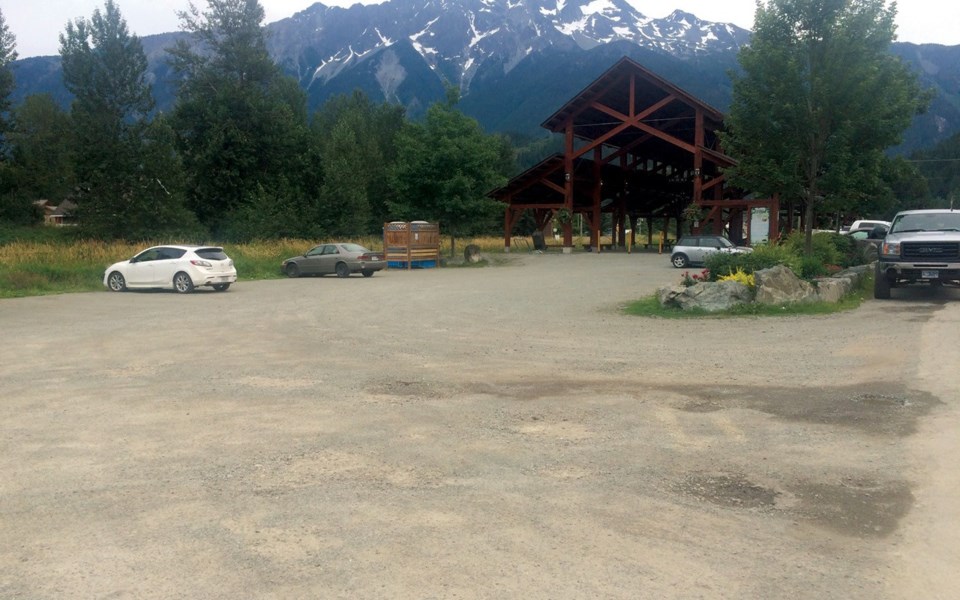The Village of Pemberton is now able to borrow up to $980,000 to cover the cost of extending and paving the parking lot adjacent the Community Barn and to serve as a contingency fund for the downtown enhancement project.
Pemberton council learned of the results of a successful alternative approval process, which grants it permission to borrow the funds, during its July 8 regular council meeting, where it also gave fourth and final reading to the loan authorization bylaw.
The paving and parking lot extension job is expected to cost $100,000, with the remaining $880,000 allocated for any potential cost overruns (the VOP is hoping not to use all of it).
Council moved forward with the loan request during its May 28 regular council meeting, but in order to do so it needed to gain the approval of the public via the alternative approval process, which called on the VOP to advertise the proposal and invite those against it to register opposition.
In total, 67 community members registered opposition. That's less than the 195 people that was needed to veto the project (10 per cent of the community's population), but more than VOP Mayor Mike Richman wanted to see.
"It was more than I would hope for," he said.
Richman feels that some might suspect that the decision to take the loan was made midway through the project. It was, rather, made back in January, before the project even began, he said.
"It took us seven years to be awarded the grant and a whole year to go to tender and get a contractor for it ... In that time, prices went up so much that we had to cut the project back to make it affordable," said Richman.
Still, there were certain pieces of the project that couldn't be sacrificed, said Richman. "There are certain elements of the project that allowed us to win the grant, and if we cut the project back any further, it would compromise the grant and the project itself."
BC TRANSIT MEMORANDUM OF UNDERSTANDING
VOP council also took a look at what transit service may look like for the next three years. Staff sought council's input on a Memorandum of Understanding (MOU) with BC Transit that sets out three changes to current transit service levels.
The proposed changes—and their related cost to the VOP—are:
•Having the 99 Pemberton Commuter stop in Rainbow Estates in Whistler. This change is set to begin in September 2020 and will cost the VOP about $2,071 annually.
•An additional midday service for the 99 Pemberton Commuter to begin in June 2021. The change would cost the VOP about $35,163 annually.
•An additional midday or later evening service on the local transit network within Pemberton. It would take effect September 2021 and cost the Village approximately $101,994 annually.
After discussing with VOP Chief Administrative Officer Nikki Gilmore, council directed staff to pursue the first item (the stop at Rainbow Estates) given that many transit users rely on the stop to access employment opportunities.
Following the meeting, Richman said the VOP is still hoping to get regional transit on the road soon, and it's better to take a wait-and-see approach on remaining initiatives in the memorandum.
As reported by Pique ("Province rejects funding model for regional transit," July 4), the regional transit project recently received a major blow when the province rejected the funding model put forward by its stakeholders, which include the VOP, Whistler and Squamish.
"We're still hopeful we can work something through with the province and our partners to provide a full regional transit system," said Richman.
"Until we know a little more about that we've deferred talking about finding the funds to fund more routes."
STATEMENT OF FINANCIAL INFORMATION
This year's Statements of Financial Information, which reveals the VOP's top earners for 2018, was presented to council at the July 9 meeting.
In total, seven staff had salaries exceeded $75,000 (the threshold that lands one on the list): chief administrative officer Nikki Gilmore earned $120,079 ($3,105 in expenses); skilled worker/firefighter Cameron Adams earned $94,839 ($600 in expenses); manager of corporate services Sheena Fraser earned $93,985 ($6,221 in expenses); and fire chief Robert Grossman earned $87,683.
In total, the VOP paid $1,728,802 to employees.
At Councillor Ted Craddock's request, council passed a resolution to include attendance at council meetings in quarterly reports.
NEW BUILDING REGULATIONS
VOP also took a major step in adopting the Energy Step Code—a new provincial standard that establishes progressive energy efficiency performance targets—at its meeting.
Staff has been liaising with Pemberton's building community about the changes, which are set to take effect on Jan. 1, 2020.
To help update the building community on the new rules and regulations, the VOP hosted a "builder's breakfast" on June 26 and a "pop-up consultation" at RONA for the general public the following day.
Staff has also circulated a survey, in person and online, which has received 40 responses so far.
"The majority of those who completed the survey indicated their support for the Village's proposal to adopt the Energy Step Code," read the staff report to council.
"Specifically, 80 [per cent] of respondents cited positive reasons for adopting the Energy Step Code."
Twenty per cent of respondents, however, felt that the VOP should not adopt the BC Energy Step Code before it is required by the BC Building Code.
To implement the changes, the VOP also gave readings one through three of a new building the code, which conforms with the BC Building Code and reflects the Step Code.
Richman said that he feels confident that the building community is by and large on board with adopting the Step Code.
"I feel that for the most part people recognize the benefits of the Step Code," said Richman. "It's taking us in a more ecological direction."




